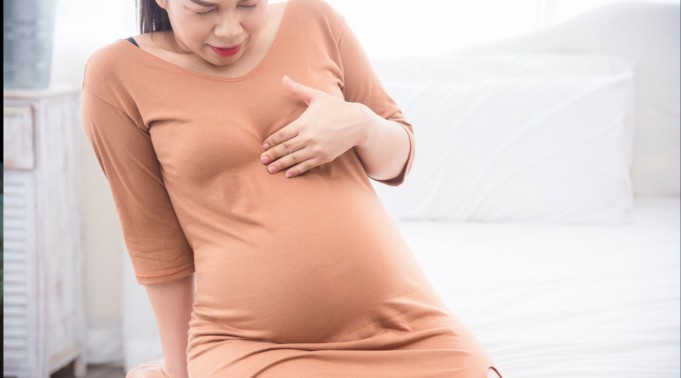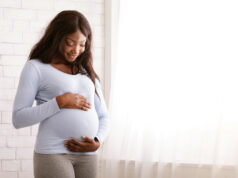You just adapted to nights without sleep, an unending appetite, and frequent visit to the restroom to empty your bladder, now you feel a painful sensation in your chest. You begin to wonder if it’s one usual pregnancy symptom or something else.
Experiencing chest pain during pregnancy can be worrying, but it’s not necessarily uncommon. There can be a number of reasons for chest pain, which most times isn’t related to your heart.
Chest pain during pregnancy can be connected to a severe health issue, but only in rare cases. Here’s all you need to know about chest pain during pregnancy, steps to take, and when to see a doctor.
Causes Of Chest Pain During Early Pregnancy
1. Morning Sickness
Usually, the first signs that show that you are pregnant are vomiting and nausea. Morning sickness happens at any time of the day (night included). This is as a result of a sharp increase in your hormones when you get pregnant.
You may experience dehydration and temporary loss of weight due to vomiting and nausea. Severe morning sickness can result in chest pain, which can come from acidic vomit irritating your throat. Constant retching can wear out your chest muscles and stomach causing muscle pain.
2. Gas
Gas causes odors, bloating, and sounds you don’t want anyone else to hear. It also causes chest pain during pregnancy; this is what is sometimes referred to as indigestion. Indigestion is a result of gas stuck in the upper part of your stomach.
When you feel bloated, you might experience chest pain either in the lower or upper part of your chest, close to your heart.
Chest pain that results from gas is more occurring during the second or third trimester of your pregnancy because, at this time, the growing baby has pushed forward in the stomach.
However, it can happen early during the first trimester. Switching pregnancy hormones can disrupt your normal digestion, thereby leading to more gassiness than usual.
3. Anxiety
On the news of a pregnancy, there’s usually a lot of excitement. Still, this excitement can turn into anxiety and stress if it’s your first pregnancy after a previous loss or if your body is beginning to show some physical changes. You might have a feeling of stress or anxiety and may result in a panic attack.
This can happen at any point in time during your pregnancy. However, it’s more likely to occur during the first few months, especially when you’re trying to adapt to the thought of a new and demanding baby or when you start worrying about your baby’s health.
The following can also give you physical symptoms like chest pain. They are:
- Difficulty in concentrating
- Dizziness
- Fast breathing
- Tightness of chest
- Jittery feelings
4. Lung conditions
If you are asthmatic, it might get severe during pregnancy. The pregnancy can bring about more severe asthma symptoms than the normal ones you’re used to, which can lead to difficulty in breathing, tightness of chest, and chest pain.
Pneumonia, lung infections, severe allergies, or a chest cold during pregnancy can also lead to chest pain. Chest pain resulting from lung conditions can occur at any time, even during the first trimester.
However, you should get your doctor informed if you notice any flu-like symptoms that result in fever during pregnancy.
5. Heartburns
Another cause of chest pain is acid reflux, which gives you a feeling like your chest is burning. This is a very common cause of chest pain during pregnancy but isn’t linked to your heart. Heartburn commonly happens close to the middle of your chest, but the pain might be felt in your upper chest.
Chest pain caused by heartburn occurs when the acid from the stomach splatter up into the esophagus – the tube that connects the mouth to the stomach. Incresed levels of the hormone progesterone during pregnancy might a major cause. This hormone calms the round sphincter muscles that usually close off the opening at the top of the stomach.
This leaking and the extra nudge on your stomach as your baby grows can lead to chest pain and heartburn during pregnancy. Although heartburn is usually common during the second and third trimesters, some women experience it in the first trimester.
Causes Of Chest Pain In Late Pregnancy
1. Lung clot
One rare but serious cause of chest pain is a blood clot in the lungs or a pulmonary embolism (PE). This is a life-threatening condition that occurs when a blood clot causes blockage in the lungs.
The risk is higher if the person has a history of blood clotting or a genetic disorder such as factor V Leiden, and if they are overweight or obese during pregnancy.
There are chances of pregnant women getting pulmonary embolism during or after labor and childbirth. It usually doesn’t occur late in pregnancy, during the third trimester.
Pulmonary embolism causes symptoms such as:
- Swelling of the leg
- Chest pain while taking a deep breath
- Fast heart rate
- Pain when coughing
If you suspect you may have a blood clot, ensure that you inform your doctor immediately.
2. Breast pain
During pregnancy, your breasts become full as it gets ready to feed your baby. Hormonal changes during pregnancy mean that you would have an increase in your bra sizes. These recent changes to your body also cause extra weight on your chest, which can lead to chest pain during pregnancy.
Those with smaller breasts may experience more pain as they fill out. Chest pain as a result of growing breasts is more severe in the third trimester, but there are chances of you experiencing breast tenderness or chest pain as early as the first trimester.
3. Serious heart conditions
There are also severe, life-threatening conditions that could result in chest pain later in pregnancy. These include myocardial infarction (heart attack) and peripartum cardiomyopathy. Although these conditions aren’t common, it is important to consult your doctor if you have chest pain to eliminate these.
4. Rib pain (costochondritis)
You are aware of the changes your body undergoes during pregnancy, but are you also aware that even your bones move? In line with your growing belly, your rib cage also widens during pregnancy. This is common in the third trimester, but can also come as early as the second trimester.
The rubbery cartilage that links the ribs to the breastbone stretches, thereby resulting in pain and tenderness. Rib pain or costochondritis can cause sharp chest pain during pregnancy. It can also cause painful and difficult breathing during the last trimester.
Home Treatments For Chest Pain In Pregnancy
Most causes of chest pain during pregnancy are expected and don’t require any form of medical attention. Whether you’re going to get medical or home treatment depends on the cause of your chest pain.
Here is a list of home treatment that could help soothe the pain:
- Lay on your sides to remove any form of pressure from your lungs and chest
- Do away with spicy foods
- If you have anxiety, try listening to relaxing music, meditating, and picturing holding your baby in your arms.
- Do away with gaseous foods, like sugary and processed foods.
- Apply a cold compress to help reduce muscle pain and swelling.
- Ensure that you put on a bra that provides firm support without being tight or having an underwire.
- Take ginger tea to reduce nausea.
- Use a body pillow when sleeping to support the extra weight.
- Eat meals in bits severally to get relieved from vomiting and nausea.
- Avoid foods that might increase your heartburn such as chocolate, tomatoes, citrus fruits, and mint.
- Use a warm compress to help relieve rib and muscle pain.
- Eat foods high in calcium, iron, magnesium, and vitamins.
- Visit a therapist or behavioral health provider concerning anxiety if self-management doesn’t help.
Medical Treatment For Chest Pain In Pregnancy

Most chest pain in pregnant women doesn’t require treatment, but in the case of severe chest pain during pregnancy, or if the cause doesn’t go away, your doctor may prescribe medical treatment.
Walking often and the use of compression socks can help prevent blood clots in your legs and any other part of your body. Your health care provider may also prescribe heparin (a blood-thinning medication) after your delivery in order to prevent blood clotting.
If you also experience blood pressure issues, your doctor may need to prescribe the necessary medication or make an adjustment to an already prescribed medication.
If your morning sickness is severe, you might be needing medications and intravenous fluids recommended by your doctor to help keep vomiting and nausea at bay.
When To Consult A Doctor
Ensure you see a doctor as soon as you notice any pain in your chest that is serious, doesn’t go away, or you experience any other symptoms when lying down or resting. Some women get high blood pressure and other heart-related conditions during pregnancy.
Ensure you seek urgent medical attention if you experience any of this:
- Excessive nausea and vomiting
- Dizziness
- Headache
- Heart palpitations
- Fainting
- Calf muscle pain or leg pain
- Difficulty breathing or shortness of breath
- Blurred vision
- Swelling of the face or any part of your body
- Fast heart rate
- Sudden breathlessness
- Chest pain that gets worse when coughing
- Peeing less than usual or dark urine
- Swelling of the ankle or leg
Make sure to inform your doctor if you’ve ever had a blood clot or varicose vein, and you’re experiencing chest pain during pregnancy. It is also important to let your doctor know if there is a history of varicose veins, stroke, heart disease, and blood clots in your family.
There is a high risk of you getting a pulmonary embolism if it runs in your family.
Other Symptoms That May Come With Chest Pain In Pregnancy
On the advancement of your pregnancy, the shifts and changes it brings about in your body can increase your heart rate, making it higher than usual. Your lungs and stomach may also get pushed up by your growing baby; for this reason, you may experience chest pain alongside other symptoms such as:
- Low blood pressure
- Shortness of breath
- Increased heart rate
- Tiredness
- Difficulty in breathing while sleeping or lying down flat (you can try using pregnancy pillows for extra comfort).
- Heart palpitations
Conclusion
Chest pain during pregnancy is nothing to really worry about. Conditions such as asthma, stress, a cold, and other common conditions could result in chest pain when you are pregnant, and this has nothing to do with your heart.
Other causes of chest pain could be your newborn’s added weight, shifting organs, or changing body. Chest pain suggesting a more severe health condition, is often uncommon. Just ensure you tell your doctor if you experience any severe symptoms or if your body doesn’t feel right.
References;
- Morning Sickness – Mayo Clinic
- Indigestion and heartburn in pregnancy – NHS
- Cardiac signs and symptoms during pregnancy – Northwestern Medicine
- Heartburn in pregnancy – NCBI












